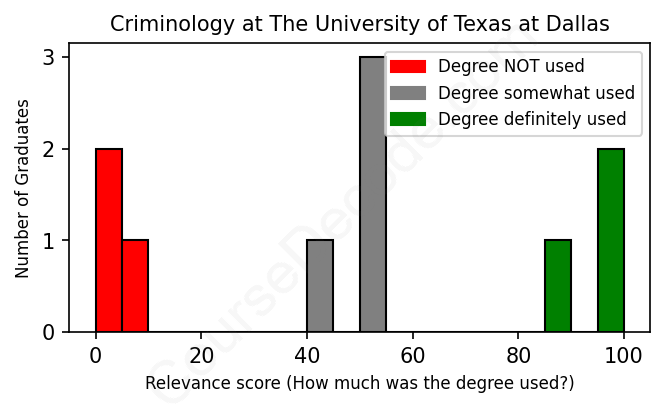
First, some facts. Of the Criminology graduates from The University of Texas at Dallas we've analyzed , here's how many have used (or NOT used) their degree in their career:

These are estimates based on AI analysis of 10 LinkedIn profiles (see below).
The verdict? Significantly below average. Overall, with an average relevance score of 48%, Criminology graduates from The University of Texas at Dallas have a much lower likelihood (-19%) of finding work in this field compared to the average graduate across all fields:
And for comparison, here's the chart for all profiles we've looked at across all degrees.
Also, after graduating, only 20% of these graduates have pursued further education other than another Bachelor's degree (such as a Masters degree or other), compared to the average across all profiles of 35%. This suggests a Bachelors degree is enough for most Criminology graduates, and it's normal to look for work straight after graduation.
See the details:
|
Relevance score: 5% We think this person has NOT gone into a career related to their degree. We think this person has NOT gone into a career related to their degree.
DEGREE INFOGraduated in 2017 from The University of Texas at Dallas with a Bachelor of Arts (B.A.) in Criminology. No other secondary education since. JOB HISTORY SINCE GRADUATIONCustomer Service Representative Wells Fargo Aug 2018 - Jan 2020 Loan Processor  Wells Fargo Jan 2020 - Aug 2021 Business Relationship Support  Wells Fargo Aug 2021 - Oct 2023 Claims Resolution Rep I APD  Liberty Mutual Insurance Jan 2024 - Present ABOUTI graduated from the University of Texas at Dallas with a bachelor's degree in Criminology in 2017. I am a military vet with experience in analyzing and disseminating crucial data. I have call center experience along with security task force experience while in the U.S.Navy. I am self motivated, willing to work as hard as necessary to get the job done. I am personable, and enjoy people and want to be of service. Currently I am a Loan Documentation Processor with Wells Fargo |
The top 10 most common jobs done by the graduates we've analyzed (ranked most common to least) are:
After looking through the job history of people who graduated with a degree in Criminology from The University of Texas at Dallas, it seems like many of them have pursued careers in roles that either connect to law enforcement or have some association with legal and safety considerations. A number of graduates have taken on positions directly relevant to criminology, such as working as telecommunications officers, records technicians, or even child protective investigators, where they can put their understanding of crime and law into practice. On the other hand, it’s pretty clear that not all jobs in the list are related to criminology. Some have gone on to work in roles like customer service representatives, sales advisors, and administrative assistant positions, which often have little to do with their criminology background.
So, overall, while there are some solid examples of criminology graduates landing jobs that utilize their degree effectively, a significant number have also drifted into roles that don’t really take advantage of their criminological knowledge. It might suggest that while the degree can open doors in law enforcement and legal fields, graduates are also finding opportunities in various other sectors that don’t strictly rely on their criminological skills. This mix indicates that while a Criminology degree has its practical value, versatility in the job market can sometimes lead to careers outside the expected path.
Here is a visual representation of the most common words in job titles for Criminology graduates (this is across all Criminology graduates we've analyzed, not just those who went to The University of Texas at Dallas):

Looking at the career paths of graduates from The University of Texas at Dallas with a degree in Criminology, it seems like there's a bit of a mixed bag when it comes to their first jobs. A lot of the early roles are quite varied, with some jumping into positions related to law enforcement, like the Telecommunications Officer and various police department roles, while others have taken surprisingly different paths, such as working in customer service at Wells Fargo or as a physical education coach. These first jobs often serve as stepping stones, sometimes in fields that don’t seem directly tied to criminology.
Fast-forward five to ten years, and you can see a clearer trend towards more established careers within criminology-related fields. Many have made their way into law enforcement or legal services, like the Associate at an attorney’s office or roles in the Texas Commission on Environmental Quality, which, while not typical, still involves regulatory frameworks similar to those studied in criminology. Others, though, have ended up in jobs that don’t align as closely with their degree—like a supervisor at a retail store, which brings into question how directly these roles relate to their studies. Overall, while some grads have found their niche in criminology or related areas, others have drifted away into roles that don’t capitalize on their education, reflecting the diverse paths people can take after graduation.
The Bachelor’s degree in Criminology at The University of Texas at Dallas is pretty manageable for most students, so you might find it a bit easier than some other majors out there. While it does involve some heavy reading and writing, especially when you dive into theories and research methods, it’s not usually the stress-fest that more technical fields can be. If you're interested in the social aspects of crime and enjoy understanding human behavior and society, you'll likely find it engaging and rewarding rather than overwhelming. Just keep up with your coursework, and you'll probably do just fine!
Most commonly, in the LinkedIn profiles we've looked at, it takes people 3 years to finish a Bachelor degree in Criminology.
Looking at these Criminology grads from The University of Texas at Dallas, it seems like there’s a mixed bag in terms of earnings. Some, like the one who moved up from a phlebotomist to a co-owner of a company, and another who went from being a summer law clerk to an associate at a law firm, are likely doing pretty well now, especially in positions tied to law and management. On the flip side, others, especially those who’ve stuck with roles that don't usually pay high, like customer service and administrative positions, might not be making as much. Overall, it feels like some are on an upward trajectory toward decent salaries, while others might still be figuring it out.
Here is a visual representation of the most common words seen in the "about" section of LinkedIn profiles who have a Bachelor degree in Criminology (this is across all Criminology graduates we've analyzed, not just those who went to The University of Texas at Dallas). This may or may not be useful:

Here are all colleges offering a Bachelor degree in Criminology (ordered by the average relevance score of their Criminology graduates, best to worst) where we have analyzed at least 10 of their graduates:
| College | Score | Count |
|---|---|---|
 California State University, Fresno California State University, Fresno
|
67 | 20 |
 George Mason University George Mason University
|
63 | 27 |
 Arizona State University Arizona State University
|
58 | 17 |
 Missouri State University Missouri State University
|
57 | 11 |
 The Ohio State University The Ohio State University
|
56 | 16 |
 Penn State University Penn State University
|
55 | 16 |
 Florida State University Florida State University
|
54 | 60 |
 West Virginia University West Virginia University
|
51 | 20 |
 University of Maryland University of Maryland
|
51 | 11 |
 John Jay College (CUNY) John Jay College (CUNY)
|
50 | 21 |
 University of South Florida University of South Florida
|
49 | 47 |
 Central Connecticut State University Central Connecticut State University
|
49 | 13 |
 University of Florida University of Florida
|
48 | 21 |
 The University of Texas at Dallas The University of Texas at Dallas
|
48 | 10 |
 Indiana University of Pennsylvania Indiana University of Pennsylvania
|
48 | 20 |
 Mississippi State University Mississippi State University
|
46 | 10 |